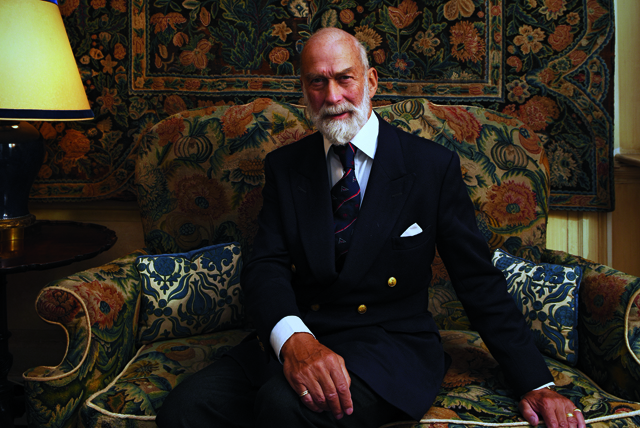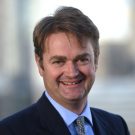Interview: Prince Michael of Kent
Prince Michael of Kent, the royal patron of the Country Life Fair, on fast cars, missing Gloucestershire and Russian ties.


Rural life is of fundamental importance to Britain,’ says Prince Michael of Kent, the royal patron of the first Country Life Fair, which takes place at Fulham Palace, SW6, this weekend. Some of his happiest times have been spent in the country. He was born in Iver, south-east Buckinghamshire, when that was still a rural idyll and he spent 25 contented years in Gloucestershire before having to sell his early-18th-century neo-Classical gem, Nether Lypiatt.
‘It has a lovely garden; the children were brought up there. We had horses in the stables. We rode a lot and it was a place we very much regarded as home.’ All this is explained in a mellifluous bass voice tinged with nostalgia. If there is a note of regret, it is understandable. ‘We were very, very fond of it. We were very lucky to have a lovely house to ourselves for so long.’
We meet in the walled garden next to his apartment at Kensington Palace, where he now pays the market rent to the Crown Estate. It’s a balmy September afternoon and we sit in the shade of an Indian-style tented pavilion. Wearing a navy blazer and grey flannel trousers, the Prince is in relaxed mode, but his large collared white shirt and big-knot tie remain his sartorial leitmotif even when not on official duty.
On the other side of the neat lawn, beyond a tinkling fountain, is a pillared loggia with the memorial stones commemorating his and his wife’s favourite horses and dogs. They are inscribed with heartfelt, unstuffy tributes such as ‘loved like no other’. It is a little piece of England in the capital, a location of happy memories and a reminder of what he cares about.
But the Prince is aware of the challenges that the countryside faces as well as the pleasures it can bring. ‘The population is growing fast, so there’s a need for housing and demand for new roads,’ he explains with impeccable politeness, ‘and that new railway line up to the Midlands and wind farms. But there has to be a balance. It’s a juggling act, but, all too often, the countryside is losing out and, once it’s gone, it’s gone.’
He and the Princess hunted with the Duke of Beaufort’s, a hunt at the forefront in defending the sport during the build-up to the ban. ‘People who live in the countryside are often misunderstood and under-represented. I think more needs to be done to educate townspeople about the countryside and imbue in them a sense of responsibility.
‘Townies determine the way we live our lives and if only they had a deeper knowledge of rural affairs, they’d learn not to vote against issues that really only affect the country they know nothing about. There needs to be more awareness of the work carried out by people who live on the land: farmers, gamekeepers and many others who are employed there.’
Exquisite houses, the beauty of Nature, and how to get the most from your life, straight to your inbox.
As the second son of the fourth son of The Queen’s grandfather, George V, the Prince is not a senior royal. He doesn’t receive an allowance from the Civil List and, since marrying his Catholic wife Marie-Christine (formally known as Princess Michael), he’s no longer in the line of succession, but he has duties and commitments and is conscious of his obligations. His patronage of many charities keeps his diary full, as well as displaying where his interests lie, such as his passion for motoring and cars.
As president of the Royal Automobile Club, he regularly participates in the London to Brighton rally. He’s also a champion of the Brooklands Museum Trust, which recalls the great days of car racing, the first purpose-built race track constructed in 1906 and where a huge number of aircraft were constructed during the Second World War.
His eyes light up as he recalls some of the cars he has driven, such as a 1939 Napier-Railton Special: ‘It has a bonnet from here to kingdom come and it’s very, very quick.’ Earlier this month, he presented the Spirit of Motoring award for the restoration of a 1934 Triumph Dolomite Roadster. Combining his love of cars and rural England, he says Cumbria and the borders are the best places to enjoy both. ‘It’s marvellous country and not a cat in sight. When the roads are open and there’s no one about, it’s more agreeable from the speed point of view.’
He makes no secret of his love for Russia; his mother was the daughter of the Grand Duchess Elena Vladimirovna and, before the troubles in Ukraine, he visited Russia at least twice a year, where he was fêted whenever he made speeches in perfect Russian. With his well-groomed but fulsome beard, he strikes an uncanny resemblance to the last Tsar.
He is saddened by what’s happening there, particularly as this is the Anglo-Russian year of culture. ‘I’m very anxious about it. I think there’s a great deal to be said for trying to just look at it very calmly. I’m a great one for keeping the door open between people or organisations and, indeed, countries. The Russians have an extraordinary resilience to tolerate and withstand all the horrors of life. I mean, they had 70 years of it.’
It’s natural that the Prince still takes a great interest in matters military; he served in the army for 20 years, wearing the cherry-picker trousers of the 11th Hussars, which amalgamated with the 10th Hussars during his time to form the Royal Hussars. The latter part of his career was in intelligence and he still has a fascination for the subject, which was awakened by John le Carré, who taught him at Eton. But there’s nothing clandestine about his hopes for the Country Life Fair. He has ‘always loved the outdoor life’ and is excited that this aspect is being brought to the capital.
Prince Michael of Kent is royal patron of the Country Life Fair at Fulham Palace, London SW6, on September 27–28 (0844 453 9268; www.countrylifefair.co.uk)
Where is your favourite place in Britain? Nether Lypiatt, Gloucestershire.
What is your favourite building? Castle Howard in North Yorkshire.
Book? Anything by John le Carré or Tolstoy.
Music? Schumann’s piano concerto in A minor.
Holiday? Tuscany or Umbria.
Dinner guest? Sir Peter Ustinov. When he came to dinner, he spent the whole evening imitating people. Two renderings stuck in my mind: a Chinese civil servant blowing his nose and a Soviet general viewed from behind.
* This article was first published in Country Life magazine on September 24 2014
